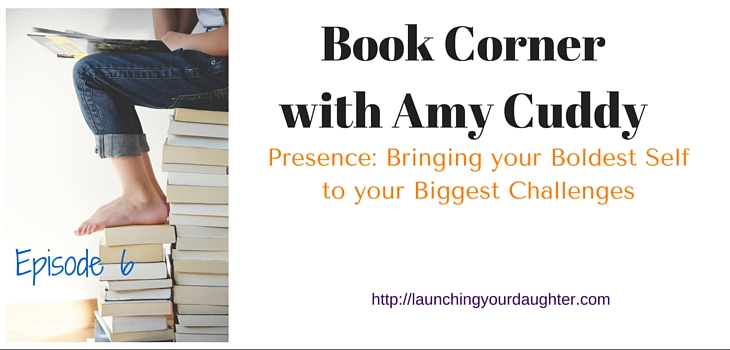
Today’s Book Corner episode on Amy Cuddy’s book called Presence: Bringing your Boldest Self to your Biggest Challenges published in 2015 by Little, Brown and Company; Hachette Book Group in New York.
Amy was in a car accident when she was 19 years old and left her with a traumatic brain injury. Amy talks about how it left her feeling “anxious, disoriented, making bad decisions, not sure what to do next” in her life. Currently she is a Harvard Business School professor and social psychologist, known around the world.
Throughout this book, Amy shares scientific research and interviews on the connection between our bodies and minds. How we can manage challenges and stressors in our lives through being present, more aware of body poses and small nudges can make a big differences. She defines presence as “..is the state of being attend to and able to comfortably express our true thoughts, feelings, values, and potential.” (p.24)
She shares that when we are present we can:
- feel more confident
- be more authentic
- help others feel more seen and heard
- and have more personal power
She discussed impostor syndrome, how most of us have felt this at one time or another and it is not just felt by women or specific demographics. “When we feel like imposters, we don’t attribute our accomplishments to something internal and constant, such as talents or ability; instead we credit something beyond our control, such as luck.” (p. 101)
Amy shares illustrations in the book on powerful vs powerless poses and how we hold our bodies impacts our thoughts and feelings. She shares some of William Jame’s research from the 1800’s on the body/mind connections. In her TED talk she shares doing the Wonder Woman pose and in the book shares a women sharing her and her family “starfish up” (standing with your arms above your head as if you scored a goal and your feet hip width apart.) If you are not feeling confident or struggling with anxiety, try standing in one of these poses for a minute or two and notice if you begin to feel different. Another body/mind connection she speaks about is yoga. In future podcast episodes I will share interviews with yoga instructors and how this can help reduce anxiety or depressive symptoms.
The last part of the book, Amy discussed how small incremental changes, or nudges, can lead to big changes in our lives.
“Nudges are effective for several reasons:
- Nudges are small and require minimal psychological and physical commitment
- Nudges operate via psychological shortcuts
- Our attitudes follow from our behaviors”
Remember the neurons that fire together wire together, which means when you do specific behaviors over and over those behaviors are reinforced. As Amy states in her TED talk and in this book “Don’t fake it till you make it, fake it till you become it.”
I hope you have enjoyed the brief review of Amy Cuddy’s book. You can find a link on my Resource page
Or watch her TED talk from 2012.
https://www.ted.com/talks/amy_cuddy_your_body_language_shapes_who_you_are
If you are seeking therapy for your daughter and located in Indiana, I offer virtual or online counseling. Please go to my Contact page.
